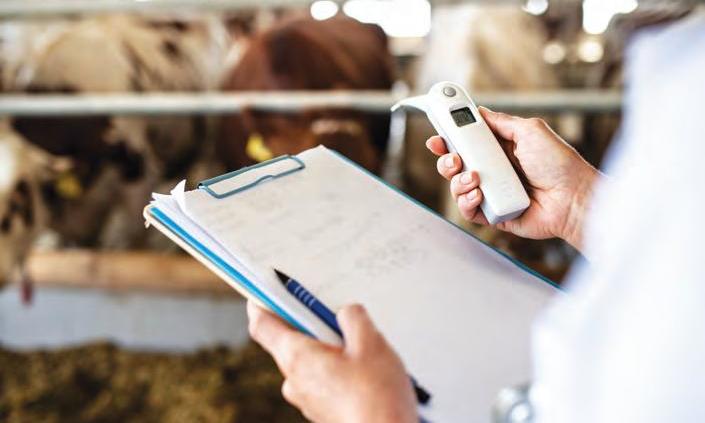S04 AF MayJune 2020 Livestock_Layout 1 18/05/2020 16:20 Page 14
LIVESTOCK
The battle against the COVID-19 pandemic could spur technologies and investment to aid farmers grappling with livestock disease management. Martin Clark explores the opportunities.
Digital disruption: Future of animal health
Dubbed the ‘Fitbit for cows’, wearable biosensors are being trialled by two Scottish companies, Biotangents and IceRobotics, to help monitor the health of livestock, particularly dairy cows, with the aim of identifying the disease brucellosis at an earlier stage. 14 African Farming - May/June 2020
Image Credit: Halfpoint/Adobe Stock
T
HESE ARE DIFFICULT times for all, but the impact is being felt among Africa’s farmers and along the food production chain, including in the livestock sector. As the COVID-19 outbreak engulfed large parts of the globe, veterinary activities were designated as essential by the World Health Organisation (WHO), providing a lifeline for farmers in Africa and beyond. For livestock farmers it has been an especially worrying time, coping not only with the fall-out from the Coronavirus pandemic, but also controlling diseases, pests and other typical issues facing their animals. Indeed, the scope of the pandemic alone, in how it has blighted the world and its economy, is daunting enough — but there is hope, reckon experts. In one regard, the COVID-19 crisis has prompted calls for a more unified approach to human and animal health, an idea popular among the veterinary community for years. The World Organisation for Animal Health notes that even if the virus causing COVID-19 (SARS-CoV-2) emerged from an animal source, the pandemic is being driven by human-to-human contact. In a 24 April statement, the Paris-based group called for more multi-sectoral collaboration and the sharing of expertise under a ‘One Health’ approach — a collaboration that might take many forms. Veterinary services have already contributed towards building a response to the pandemic, supporting the work of
The COVID-19 crisis has prompted calls for a more unified approach to human and animal health.
human health authorities. Further, vets continue to support other critical needs, including food security and safety intrinsically linked to sound animal production systems. Technology overlap There are overlaps in some of the technologies being put forward to counter the Coronavirus pandemic in humans that could yield benefits to African farmers, both those nurturing crops and livestock. With the prevalence of cell phones worldwide, that now includes the use of innovative mobile technologies, something that could yield immense benefit especially among remote, rural farmers. Cranfield University in the UK, for instance, is working in Madagascar to evaluate how effective a mobile phone app is in helping smallholder farmers better fertilise their land. “Fertiliser use is key in this subsistence system, but there’s little data available to help farmers take measures to improve their current practices and management,” said project lead, Dr Ruben Sakrabani, senior lecturer in soil chemistry. “This simple tool could make a huge difference to their farming yields, saving cost and improving their livelihoods.” The system uses a paper strip to analyse soil nutrients. The strip changes colour when
inserted into soil extracts, and its colour intensity is measured by the app, which then recommends levels of fertiliser to use. Similar advances are being made in the area of livestock management, such as the development of wearable health sensors, a trend in monitoring fitness activity in humans. Dubbed the ‘Fitbit for cows’, these new wearable biosensors are being trialled by two Scottish companies, Biotangents and IceRobotics, to help monitor the health of livestock, particularly dairy cows, with the aim of identifying the disease brucellosis at an earlier stage. Brucellosis is a highly contagious bacterial infection that primarily affects livestock and can also be passed onto humans. The portable test is being developed to allow rapid confirmatory diagnosis of suspected cases. IceRobotics’ wearable sensors are noninvasively placed on livestock monitoring daily activities 24/7. Advanced processing of this information can help vets to monitor any changes in behaviour which might be early indicators for illness and allow them to shortlist livestock at an early stage, noted Dr Vivi Thorup, lead animal scientist at IceRobotics. Biotangents is also developing a diagnostic test which will be portable and
www.africanfarming.net






